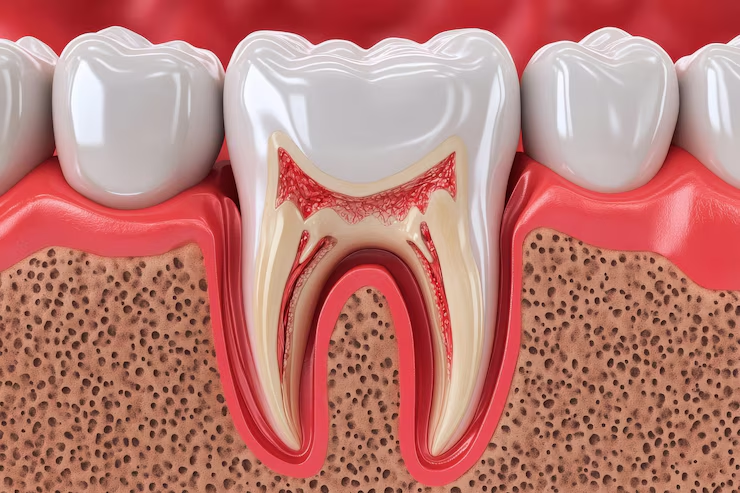Periodontal disease, commonly known as gum disease, is a prevalent condition affecting millions of people worldwide. It ranges from simple gum inflammation to severe damage to the soft tissue and bone that support the teeth, potentially leading to tooth loss. However, the good news is that periodontal disease is largely preventable with proper oral hygiene and regular dental care. This article will provide practical tips for maintaining healthy gums and preventing periodontal disease, while also discussing the role of periodontal treatment and the economic impact of dental clinics in Australia.
Understanding Periodontal Disease
Periodontal disease is primarily caused by plaque, a sticky film of bacteria that constantly forms on your teeth. If not removed through regular brushing and flossing, plaque can harden into tartar, which can only be removed by a dentist. The bacteria in plaque and tartar can lead to inflammation of the gums, a condition known as gingivitis—the earliest stage of periodontal disease. If left untreated, gingivitis can progress to periodontitis, a more severe form of gum disease that can damage the gums and the bones that support the teeth.
Tips for Preventing Periodontal Disease
1. Brush and Floss Regularly: The foundation of good oral hygiene is regular brushing and flossing. Brush your teeth at least twice a day using fluoride toothpaste and a soft-bristled toothbrush. Make sure to brush along the gum line to remove plaque. Flossing at least once a day helps to remove food particles and plaque from between your teeth where your toothbrush can’t reach.
2. Use an Antiseptic Mouthwash: An antiseptic mouthwash can help reduce plaque and bacteria in your mouth, which contributes to gum disease. Look for mouthwashes that contain ingredients like chlorhexidine or essential oils, which are effective in controlling plaque.
3. Regular Dental Check-ups and Cleanings: Regular visits to your dentist are crucial in preventing periodontal disease. Dental professionals can spot early signs of gum disease and provide treatment before it becomes more severe. Professional cleanings remove tartar that can’t be removed by brushing and flossing alone.
4. Quit Smoking: Smoking is a significant risk factor for periodontal disease. It affects your immune system, making it harder for your body to fight off gum infections. Smokers are also more likely to develop severe periodontitis, which can lead to tooth loss. Quitting smoking can significantly improve your oral health and reduce your risk of gum disease.
5. Maintain a Healthy Diet: A balanced diet rich in vitamins and minerals supports healthy gums and teeth. Foods high in vitamin C, such as citrus fruits and leafy greens, help maintain gum health by promoting collagen production. Avoid sugary snacks and beverages, as they can contribute to plaque buildup.
6. Manage Stress: Stress can weaken your immune system, making you more susceptible to infections, including gum disease. Incorporating stress-reducing activities like exercise, meditation, or yoga into your routine can help maintain not only your overall health but also your gum health.
7. Be Aware of Changes: Pay attention to changes in your gums, such as redness, swelling, or bleeding when you brush or floss. These can be early signs of periodontal disease. If you notice any changes, schedule a visit to your dentist for an evaluation.
The Role of Periodontal Treatment
If periodontal disease does develop, timely and effective periodontal treatment is crucial to prevent further damage. Treatments can range from non-surgical options, such as scaling and root planing (deep cleaning), to surgical procedures like flap surgery or bone and tissue grafts in more advanced cases. Periodontal treatment aims to clean the pockets around teeth and prevent damage to surrounding bone.
Advanced technologies, such as laser therapy and regenerative procedures, have improved treatment outcomes, making them less invasive and more effective. Laser therapy, for instance, targets diseased tissue and bacteria, reducing inflammation and promoting healing without the need for more extensive surgery.
Economic Impact of Dental Clinics in Australia
Dental clinics play a significant role in the Australian economy, not just in terms of healthcare but also through their broader economic impact. The economic impact of dental clinics in Australia includes job creation, contributions to the healthcare system, and the enhancement of overall public health. Dental clinics provide employment opportunities for dentists, dental hygienists, dental assistants, and administrative staff, contributing to the local economy.
Preventive care, including periodontal treatment, helps reduce the long-term costs associated with advanced dental issues. When gum disease is prevented or treated early, it reduces the need for more costly and complex procedures, such as dental implants or extensive restorations. This, in turn, reduces the financial burden on patients and the healthcare system.
Moreover, maintaining good oral health has a positive impact on productivity and overall quality of life. Healthy gums and teeth allow individuals to eat, speak, and socialize without discomfort or embarrassment, contributing to better mental and physical health outcomes.
Preventing periodontal disease is essential for maintaining overall health and well-being. By following simple steps like regular brushing and flossing, visiting your dentist regularly, and making healthy lifestyle choices, you can keep your gums healthy and prevent the progression of gum disease. Periodontal treatment plays a vital role in managing and reversing gum disease when it occurs, and the broader economic impact of dental clinics in Australia highlights the importance of investing in preventive dental care. Remember, healthy gums are the foundation of a healthy smile!







